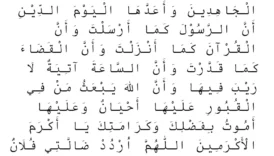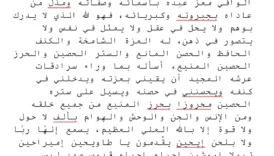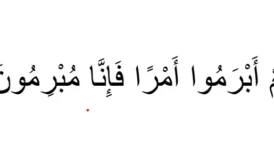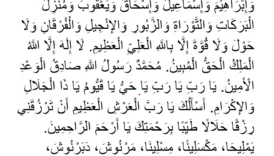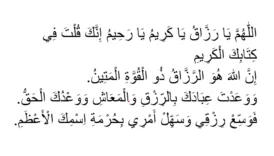Istikhārah Prayer and Du‘ā’: Seeking a Sign of Good or Bad Outcomes in Dreams
In Islamic tradition, Istikhārah is a special prayer offered when seeking guidance from God (Allah) regarding whether a certain decision or action is beneficial or potentially harmful. The Prophet Muḥammad (peace be upon him) recommended istikhārah to the believers when faced with uncertainty, particularly for major life decisions. Below, you’ll find how to perform the Istikhārah prayer, the du‘ā’ (supplication) that accompanies it, and how to interpret dream signs—especially regarding colors that may indicate a favorable or unfavorable outcome.
- Istikhārah Prayer and Du‘ā’: Seeking a Sign of Good or Bad Outcomes in Dreams
- 1. What Is Istikhārah?
- 2. How to Perform the Istikhārah Prayer
- 3. The Istikhārah Du‘ā’ (Arabic Text, Transliteration, and Translation)
- Arabic Text
- Transliteration
- English Meaning
- 4. Interpreting Colors and Signals in Your Dream
- 5.Steps for Istikhārah
- Final Thoughts
1. What Is Istikhārah?
- Definition: The Arabic term “istikhārah” means “to seek goodness” or “to seek what is best.” In practice, it refers to a two-rak‘ah prayer followed by a specific du‘ā’, asking God to grant clarity and to direct you toward what’s best for your religious and worldly affairs.
- Timing: While one can perform istikhārah at any point of uncertainty, a common practice is to pray it on Thursday night, transitioning into Friday (i.e., Friday early morning hours), or simply during the late night when one is more at peace and focused.
2. How to Perform the Istikhārah Prayer
- Make a Clear Intention
- For instance: “O Allah, guide me about the outcome of [mention your specific matter] and show me if it is good or bad.”
- Pray Two Rak‘ahs (Units) of Optional Prayer
- First Rak‘ah
- Begin with “Allāhu Akbar” (God is Greatest).
- Recite Sūrat al-Fātiḥah, followed by any short sūrah (many people choose Sūrat al-Kāfirūn).
- Second Rak‘ah
- Recite Sūrat al-Fātiḥah, followed by another short sūrah (Sūrat al-Ikhlāṣ is popular).
- Conclude the prayer with salām after completing the two rak‘ahs.
- First Rak‘ah
- Voice Your Request
- Once finished, raise your hands and say something like, “O Allah, regarding [specific concern], if it’s good for me, show me favor; if it’s harmful, keep me away and guide me toward something better.”
- Recite the Istikhārah Du‘ā’
- After expressing your concern, recite the istikhārah supplication (detailed below).
- Ideally, do not engage in any other conversation (worldly talk) afterward; find a peaceful moment before going to sleep.
3. The Istikhārah Du‘ā’ (Arabic Text, Transliteration, and Translation)
Arabic Text
اللَّهُمَّ إِنِّي أَسْتَخِيرُكَ بِعِلْمِكَ
وَأَسْتَقْدِرُكَ بِقُدْرَتِكَ
وَأَسْأَلُكَ مِنْ فَضْلِكَ الْعَظِيمِ
فَإِنَّكَ تَقْدِرُ وَلَا أَقْدِرُ
وَتَعْلَمُ وَلَا أَعْلَمُ
وَأَنْتَ عَلَّامُ الْغُيُوبِ
اللَّهُمَّ إِنْ كُنْتَ تَعْلَمُ أَنَّ هَذَا الْأَمْرَ خَيْرٌ لِي فِي دِينِي وَمَعَاشِي
وَعَاقِبَةِ أَمْرِي وَعَاجِلِهِ وَآجِلِهِ
فَاقْدُرْهُ لِي وَيَسِّرْهُ لِي ثُمَّ بَارِكْ لِي فِيهِ
وَإِنْ كُنْتَ تَعْلَمُ أَنَّ هَذَا الْأَمْرَ شَرٌّ لِي فِي دِينِي وَمَعَاشِي
وَعَاقِبَةِ أَمْرِي وَعَاجِلِهِ وَآجِلِهِ
فَاصْرِفْهُ عَنِّي وَاصْرِفْنِي عَنْهُ
وَاقْدُرْ لِيَ الْخَيْرَ حَيْثُ كَانَ ثُمَّ أَرْضِنِي بِهِ
Transliteration
Allāhumma innī astakhīruka bi ‘ilmik
wa astaqdiruka bi qudratik
wa as’aluka min faḍlika’l-‘aẓīm
fa-innaka taqdiru wa lā aqdiru
wa ta‘lamu wa lā a‘lamu
wa anta ‘allāmu’l-ghuyūb.
Allāhumma in kunta ta‘lamu anna hādhā’l-amra
khayrun lī fī dīnī wa ma‘āshī wa ‘āqibati amrī
wa ‘ājilihi wa ājilihi
faqdurhu lī wa yassirhu lī
thumma bārik lī fīh.
Wa in kunta ta‘lamu anna hādhā’l-amra
sharrun lī fī dīnī wa ma‘āshī
wa ‘āqibati amrī wa ‘ājilihi wa ājilihi
faṣrifhu ‘annī waṣrifnī ‘anh
waqdur lī al-khayra ḥaythu kāna
thumma arḍinī bih.
English Meaning
“O Allah! I seek the counsel of Your knowledge and I seek the help of Your power, and I ask You from Your tremendous favor. Indeed, You have power, and I have none. You know everything, and I know nothing. You are the knower of all unseen things.
O Allah, if You know that this matter [state your concern] is good for my religion, for my livelihood, and for my affairs in this world and the hereafter, then decree it for me, facilitate it for me, and bless me with it.
But if You know that this matter is bad for my religion, my livelihood, and my affairs in this world and the hereafter, then distance it from me and distance me from it. And decree for me whatever is good wherever it may be and make me content with it.”
4. Interpreting Colors and Signals in Your Dream
- Black or Red
- Seeing these colors in a dream may indicate a negative or harmful outcome. For instance, a pitch-black scene or an overwhelming red environment might symbolize potential adversity.
- White or Green
- These colors often signify a positive or blessed result. Visuals like lush greenery or radiant white clothing in a dream can imply that the decision is likely beneficial.
- Persistence
- Sometimes clarity does not come in a single night. Many believers repeat istikhārah for three or seven consecutive nights if no meaningful sign appears at first.
- Beyond Dreams: Heartfelt Signs
- Even if you don’t see a vivid dream, you may sense a deep-seated feeling of peace or discomfort when you think about your decision. Some scholars suggest paying attention to this inward “pull” as part of your guidance.
5.Steps for Istikhārah
- When: Typically done late at night or before dawn. Some prefer Thursday night (leading into Friday).
- How:
- Perform two rak‘ahs of optional prayer.
- Make a clear supplication for guidance.
- Recite the Istikhārah du‘ā’ above.
- Then Sleep:
- Lie down on your right side, avoid worldly talk, and pay attention to your dream or any strong intuition.
- Repeat if Needed:
- If you remain uncertain, continue for three or seven nights.
Final Thoughts
Istikhārah embodies the Islamic principle of relying on God’s wisdom and guidance in all matters—especially those with uncertain outcomes. By performing the prayer and reflecting on your dreams or inner feelings, you’re spiritually aligning yourself with God’s wisdom.
- Remember: The final knowledge belongs to Allah alone. Istikhārah doesn’t guarantee an instant “yes” or “no” but positions you to gain clarity, peace of heart, and the conviction to proceed or refrain from a particular decision.
- Stay Balanced: It’s also wise to use your intellect, consult trusted people (shūrā or consultation), and weigh circumstances alongside istikhārah results.
May your prayers and efforts be blessed, and may you find the guidance and clarity you seek.
